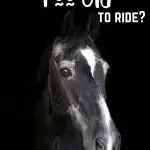As our beloved horses age and become seniors, we can see and understand time taking its toll. Not only do the physical effects show, but speed slows down, once feisty mares are a little more relaxed, etc. When these later years start to roll in, most of us begin to wonder when it will be time to commit to our pony pal being a pasture pal. Just when is a horse considered too old to be ridden?
When is a horse too old to ride? There is no one hard and fast rule in terms of years. Horses, like people, age at different rates and there are a number of factors to consider when deciding to retire one from being a working horse.
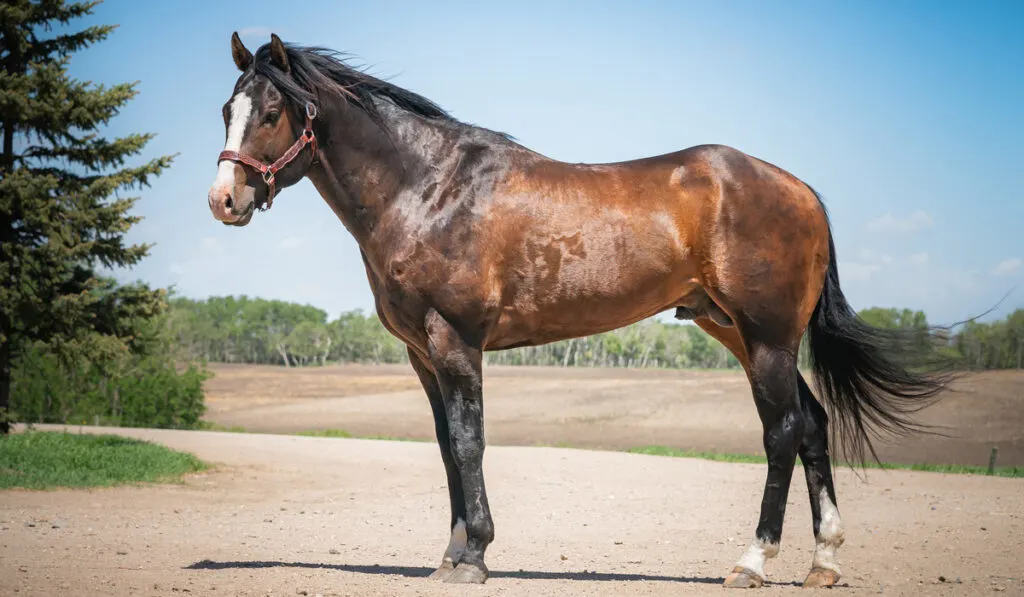
A Horse’s Lifespan
Horses generally live well into their twenties, and are considered to be middle aged in their teen years. In fact, scientists generally consider the “old age” mark to be at 20 years. (source)
That said, some horses may show those “old age” signs earlier – and some not until later! Since there are a number of horses routinely living into their 30’s, their twilight years may not always line up.
So, even though there is a general consensus of old age based on lifespan, when it comes to a horse being too old to be ridden, there are more important and individual-specific signs to be on the lookout for.
Amount of Work
It is important to take into account not only the amount of work you have planned for your horse but, in some cases, the amount of work they have done throughout their lives.
For example, in the case of thoroughbred racehorses, many were worked quite strenuously during their early years, which can have resulted in premature aging or joint issues later on.
On the other hand, if you have a horse who has lived a healthy and regularly athletic life, their body may be more conditioned to continue with riding work longer.
Body Condition
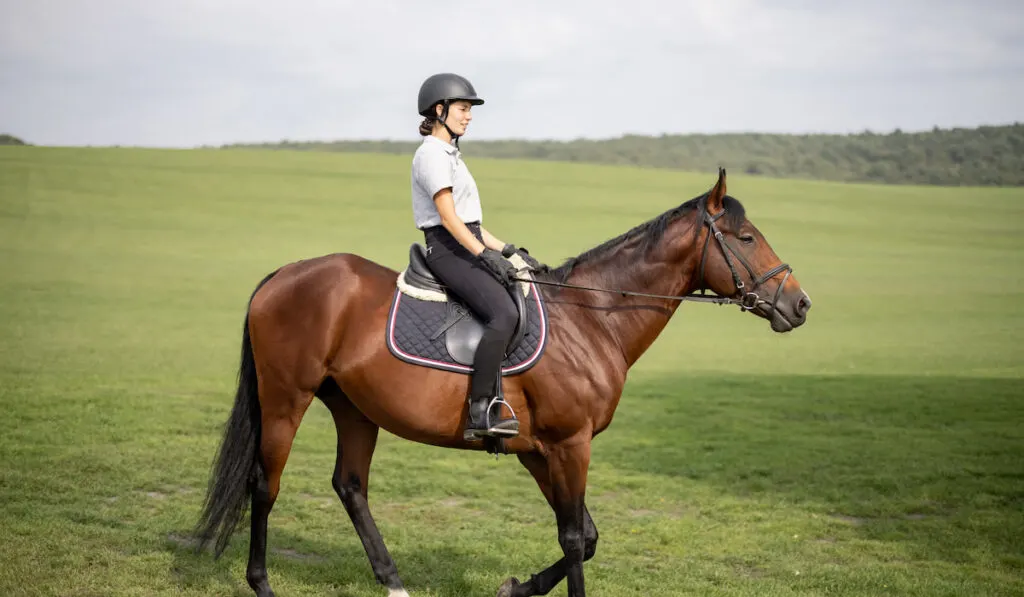
When you think of a horse in his prime, you picturing shiny fur, rippling muscles and a sure step. Older horses, though, tend to have more sunken eyes, frailer limbs and withers that have dipped into something of a sway back.
If even switching your horse to a senior feed does not make much of a difference and he is still looking scrawny or loses weight easily, it may be time to stop riding him.
Focus first on getting your horse into good condition. Age is not an excuse for a skinny horse. If you are having trouble maintaining your older horse’s weight, check out my article on addressing weight loss in older horses.
If a horse still has shoulder and leg muscles enough to comfortably carry a rider, no matter their age, they should be able to be ridden (once all other factors are considered), albeit with a modified or reduced schedule.
Rider Weight
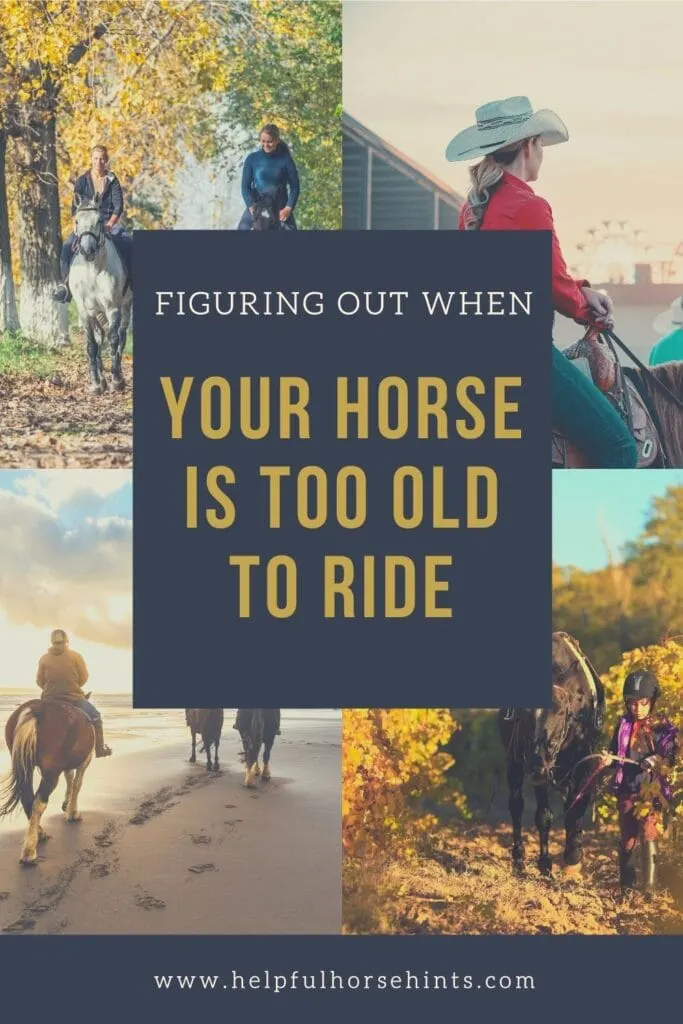
When horses get older, their bodies, just like human bodies, become frailer as they lose muscle mass and bone density. Because of this, carrying a heavier rider can be too much for them. Even a rider they once carried with ease may prove to be a physical burden to an aging back.
As I covered in my article on choosing the right size horse for your height and weight, most horses with moderate fitness can carry 20% of their own body weight.
As horses age, not only may their own weigh drop, resulting in a lower total number of pounds able to be carried, but their decrease in strength means they are able to hold a lower percentage of that lower number, too.
Age-Related Issues
Diseases that are brought on by an older and weaker immune system are not only common but important in determining if a horse can be ridden.
For example, according to Horse & Rider Magazine, it is estimated that up to 30% of horses over the age of 20 actually have Cushing’s disease (an endocrine disorder). (source) That number may sound high, but keep in mind that a number of horses go undiagnosed, too.
Kidney failure is another common concern that affects many older horses, especially those who have received medications throughout their younger years. Since water and weight retention can be a big concern there, it is best to avoid having your horse lose fluids through sweat as well as keep the calories consumed solely for maintaining weight at rest.
Dental issues are also important. Horse teeth have a “reserve crown” located beneath the gum line, which exists to compensate for tooth enamel that is worn away over the years of grinding food. As horses age, that reserve is used up and your horse’s gumline is reduced to bare spots and nubs. This means not only will accepting a bit be more uncomfortable, but your horse’s eating (and, as a result, digestion) will be affected, too.
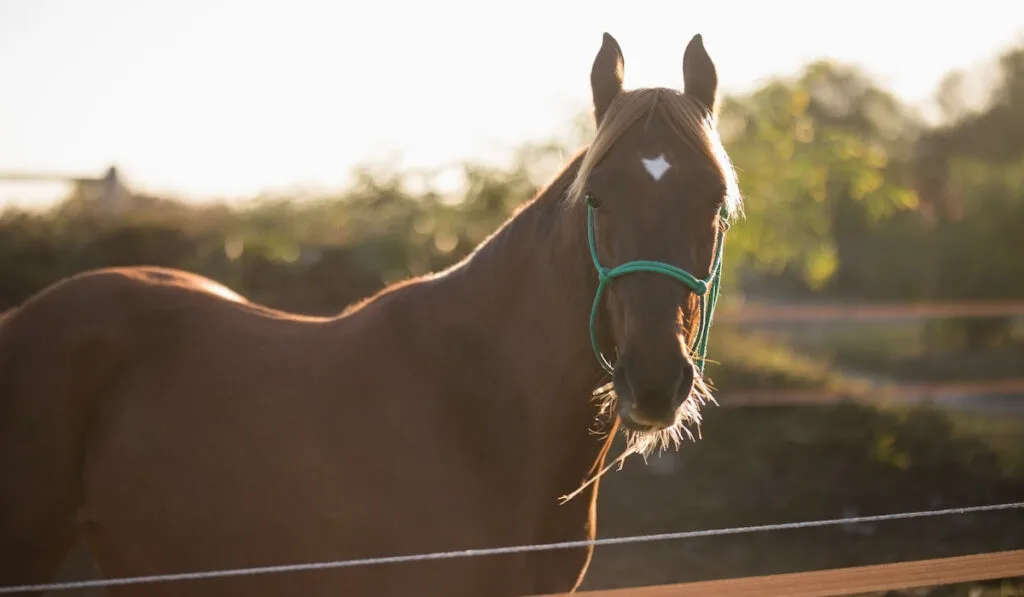
Since food will be less ground up, larger pieces will be swallowed into the stomach. These bigger chunks are harder to digest in the intestinal tract, resulting in weight loss for the horse. Further, years of eating wear and tear coupled with internal parasites causing damage mean that absorbing essential nutrients such as vitamins and minerals) is also more difficult.
From these digestion troubles can arise bowel issues (diarrhea), muscle atrophy, sway back and loss of strength.
Specially formulated senior horse feeds can help your older horse pack on the pounds and maintain a healthy weight. Check out my article on the best senior horse feeds. That article further goes into whether to look at a complete feed or supplements.
Age is also not the kindest to eyes and sight. As eye muscles degenerate and a horse’s sight worsens, they may spook more easily and be less safe and assured on rides. In fact, older horses are especially prone to eye diseases and issues.
In fact, a 2018 study by the University of Queensland shows that almost 90% of senior horses especially had eye conditions affecting them. Since horses are prey animals, they are naturally inclined to disguise issues that bother them, but your horse very well may be too compromised to ride safely.
Soundness
Your horse may also experience arthritis or lameness as a result of old injuries or just regular old wear and tear. Not only will this mean you may not want to further physically stress your horse, but, in his discomfort, a horse may move around less on his own.
This accidental sedentary lifestyle can also add to a propensity for loss of strength, muscle, and conditioning. From this, a horse that has lost too much muscle or confirmation should not be ridden, as you will only cause them more back issues and pain.
If you are noticing any lameness or limping, you can, of course, try introducing some joint supplements. However, do bear in mind that older horses, with their bone, muscle, joint, ligament, etc. may just be not sound enough to ride.
Even if your horse has previously been diagnosed with navicular or another chronic injury and it has been so far successfully managed with medications or injections, it still may be too far progressed.
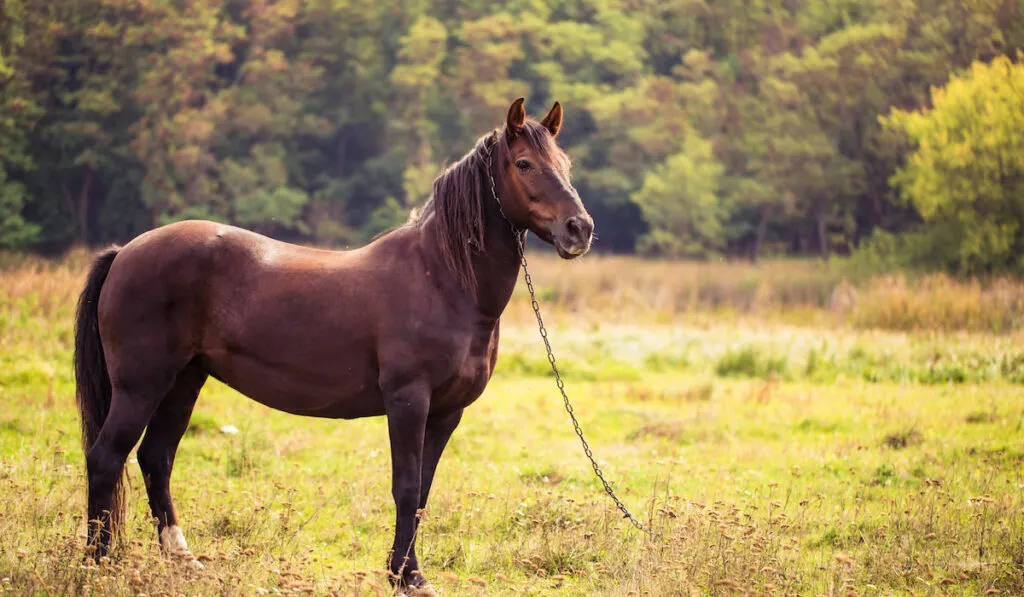
If his lameness requires constant treatment and medication to even get your horse to a point where you can mount him, it may be time to let go of riding and allow your horse to live out his last years in comfort without being worked.
Remember, your veterinarian can help you with these decisions and guide you towards an activity level that your senior horse can maintain.
Riding a Senior Horse
If your horse is close to retirement but still can be ridden a little, it is important to keep your rides to only a few days a week and the ride itself light. Rather than galloping and jumping, maybe a few quiet hacks around the pasture.
Plus, keep in mind that an older horse may require more recovery time after a ride, too.
All that being said, though, horses were designed to be active. In the wild, older horses still needed to run and traverse distances in search of food and to escape predators. The aerobic capacity of even a 20-year-old (“old age”) horse is still double than that of a human Olympic marathon athlete.
If your horse is happy, healthy, sound and willing, you can conceivably ride your “old” horse throughout his twenties. But if he begins showing any signs of discomfort or bodily deterioration, it’s best to hang up his bridle and let him enjoy a life without riding.

